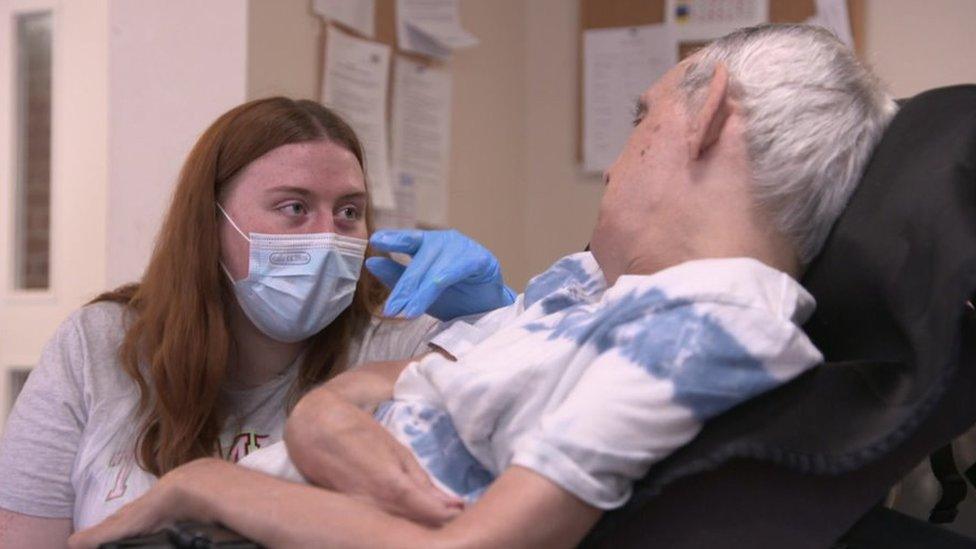Social care workers lose out on £7,000 in pay each year, charity says
- Published

Care worker Aimee, 22, supports Tony, who has complex needs
Frontline social care workers are being paid thousands of pounds less than other workers with equivalent skills, a charity claims.
Community Integrated Care said teaching assistants and police community support workers have similar skillsets but on average receive £7,000 more per year.
It is calling for an "immediate and fair" rise, saying the status quo is "immoral" and "cannot be justified".
The government said it was committed to improving the adult social care system.
The charity, one of Britain's biggest care providers, commissioned consultancy firm Korn Ferry to analyse public sector roles and compare pay rates.
Their report, Unfair to Care,, external puts support workers in the same skills league as healthcare assistants, police community support officers and senior classroom assistants.
But it also finds a large pay gap.
For example, support workers in England who assist people to live independently in the community are paid on average £17,695 a year, the researchers found.
But other public sector roles, with equivalent scope, complexity and accountability pay on average £24,602.
This rises to £25,142, for equivalent roles in the NHS, the study found - a discrepancy of almost £7,500 a year.
This leaves many social care workers living in poverty and is largely to blame for 112,000 unfilled vacancies in the sector, says the charity.
Long hours, low pay and low recognition - a combination that makes it unsurprising that care providers struggle to find and keep staff.
Supermarkets or shops often pay more. It angers care staff when they are described as low skilled and the new research underlines the complexity of the roles they take on.

'The pay needs to be addressed'
Two carers reflect on their passion for the job despite feeling underpaid.
Working at a care home is "so much more" than "making tea and wiping bums", care team leader Lucy Jantschenko says.
The 25-year-old, who works at a care home in Nottinghamshire, says workers also need the ability to be quick-thinking when things go wrong.
"Someone starts choking halfway through mealtime and you've got the nurse upstairs sorting out tablets, you're the only person there that can save them," she says.
She says all care workers "make such a big difference every day" but adds: "Then some days I've had an awful day, I've got home, I've only made £10.30 an hour when I could have been at Lidl stacking shelves for £12.50 an hour."
Aimme Murray supports adults with learning disabilities and physical disabilities who have complex needs in Leicestershire.
The 22-year-old says the job requires her to "be on the ball consistently" - sorting out the right medication and liaising with GPs and family members are among her tasks.
"I get paid the minimum wage, not the living wage because that's higher than what I get paid," she says.
"If the pay isn't addressed and things don't change, I can't see many people staying in this job."

Professional skills
The researchers say their analysis demonstrates how the role of social care workers has changed in the past decade, "as the sector increasingly supports people with highly complex health and care needs".
These days, says the study, care workers must frequently :
Support and understand complex medical and behavioural needs
Deliver medication and medical procedures
Have well developed soft skills, like empathy and tact
Show exceptional levels of personal accountability
"It is a matter of national shame that social care workers, who provide such an invaluable service to society, are in such desperate circumstances," says Community Integrated Care chief executive Mark Adams.
The charity is urging Boris Johnson to live up to a promise made when he first became prime minister, almost two years ago, to fix the crisis in social care once and for all.
To do that, the long-awaited reforms will need to address staffing, as well as how care is paid for in the long term.
With an ageing population and more adults under 65 living with disabilities, the pressures on the care system are increasing. It is propped up by many dedicated staff, who do a good job, but there is also care which is poor.
Experts maintain that to ensure quality support for anyone who needs it, it will take a workforce that is well trained and properly rewarded for the difference they can make to people's lives.
Oonagh Smyth, chief executive of Skills for Care, the strategic body for workforce development in adult social care in England, warns that reform policies "will not be successful unless they address the needs of the workforce".
Former care minister Phil Hope, co-chair of Future Social Care Coalition, added that it was "time for the government to respect, reward and regulate, to support all those on the forgotten frontline'.
"It has never been clearer that they warrant and deserve a fair deal."
The Department of Health and Social Care said in a statement the social care sector "has been an essential and valued part of the front line response to the pandemic".
The government has "sought to protect the workforce and those receiving social care", the statement said, by providing more than £2bn for the sector including infection prevention and control measures and PPE.
"We are committed to the sustainable improvement of the adult social care system and, as set out in the Queen's Speech, we will bring forward proposals later this year to ensure every person receives the care they need, provided with the dignity they deserve," the statement added.